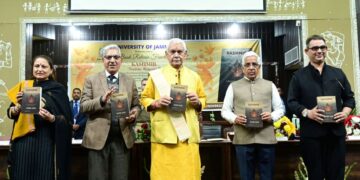HC rejects plea about dynamics of investigation having changed after Reorganisation Act of 2019
Srinagar: In the case about 2010 “backdoor appointments” in the Urban Cooperative Bank Ltd, Anantnag, the J&K High Court today rejected the contention of the then Bank chairman that dynamics of the procedure of investigation against him have changed after the Reorganisation Act of 2019 following the abrogation of the erstwhile state’s special status.
Rejecting the petition of the then chairman Ghulam Nabi Shah (Hyder Colony, Janglat Mandi, Anantnag), Justice Sanjay Dhar held “the Act of 1988 cannot be given a retrospective application in respect of offences which have taken place when the Act was not in operation in the UT of Jammu and Kashmir”.
The judge said “the provisions contained in the State Act would continue to apply in respect of offences which have taken place at the time when the State Act was in force and the investigation and trial of such offences will have to be carried out in accordance with provisions contained in the State Act and not in accordance with the provisions contained the Act of 1988”. He said the contention of the counsel for the petitioner in this regard is without any substance.
The petitioner Shah had challenged the FIR into the case on the ground that after coming into force of the J&K Re-organization Act of 2019, the provisions of Prevention of Corruption Act, 1988 (hereinafter to be referred to as Act of 1988), have been extended to the UT of Jammu and Kashmir, therefore, the procedure prescribed in this Act would be applicable to the case at hand.
The contention if held would mean that in terms of Section 17-A of the Act of 1988, without previous approval of the competent authority, the investigation against the petitioner could not have proceeded.
The petitioner challenged the 2020 FIR against him for offences under J&K Prevention of Corruption 2006 and 120-B of the RP Code (criminal conspiracy) registered with the Police Station, Anti-Corruption Bureau, Anantnag.
As per the FIR and investigation “the management of the Bank issued dozens of backdoor appointment orders in favour of their kith and kin and several others, though they were ineligible. It was alleged that these backdoor appointment orders were issued without any formal advertisement and selection process by misuse of official positions by the officers/management of the Bank”.
The appointments according the official lawyer “were made temporarily but extended from time to time to the benefit of the employees by the petitioner who further regularized the appointees in April, 2015 and placed them in the grades with a view to confer undue benefits to the candidates by abusing of his official position”.
Justice Dhar held that the provisions in Sections 17 and 17-A of the Act of 1988 would not become applicable to the case of the petitioner.
Therefore, requirement of previous approval of the competent authority in terms of Section 17-A of the Act of 1988 for investigation of the impugned FIR is not necessary, nor is it necessary that investigation of the said FIR is to be conducted by an officer of the rank of Deputy Superintendent of Police as provided in Section 17 of the Act of 1988….”.
The investigating officer, an officer of the rank of Inspector, has been specially authorized by the Superintendent of Police, Vigilance Organization to conduct investigation of the impugned FIR, and as such, he is competent to investigate the impugned FIR, said the court.
The court discarded the petitioner’s argument that an officer or employee cannot be termed as public servant and said “… Section 21 of the RPC defines “public servant”, and it brings certain persons within the purview of the definition of Public Servant. An officer or servant employed by a Cooperative Society or Cooperative Bank, whether for the whole or part of his tenure including every member of the society or bank falls within the definition of Public Servant as contained in aforesaid provisions”.
It said the grounds projected by the petitioner for assailing the FIR are meritless. The petition, as such was dismissed, meaning the process of law against the retired old officer and other accused shall continue.







